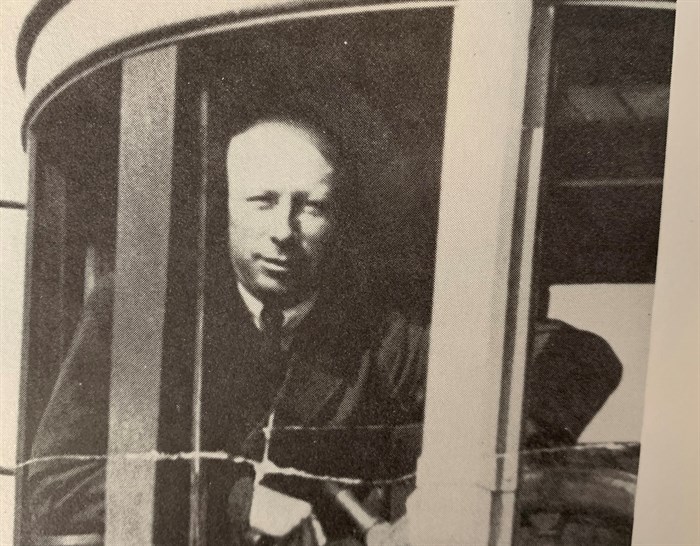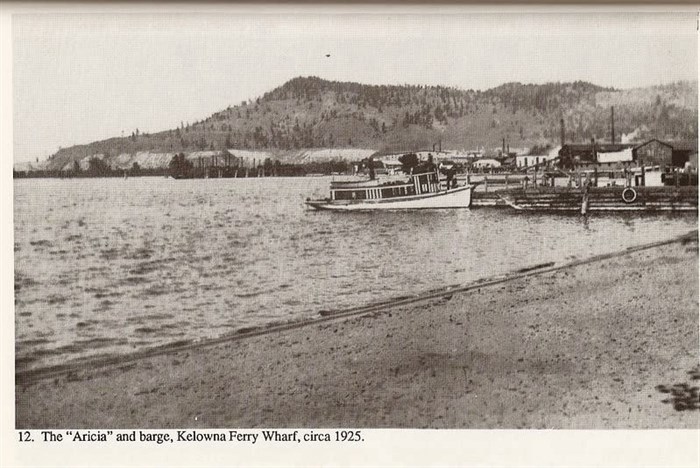
Len Hayman at the wheel of the Aricia ferry in 1924.
Image Credit: Bob Hayman/Captain Len's Ferry Tales
March 07, 2021 - 7:00 AM
One ferry captain’s observations of the good, the bad and the ugly in the Central Okanagan remain an important piece of the area's social history, says a local historian.
Len Hayman was described as one of “Kelowna’s legendary and more colourful characters,” according to author Sharron Simpson in her book, The Kelowna Story. He was instrumental in providing the ferry service between Westbank and Kelowna for roughly 40 years.
From 1906-1927, before the province began providing the ferries across Okanagan Lake, all the vessels and barges used to transport people, horses and then cars were either bought or built by captain Len.
During his time as a ferry captain, Len shared his stories with his passengers, which were compiled into a collection by his son Bob Hayman, and published as Captain Len’s Ferry Tales of the Okanagan.
“He knew another segment of society that tended to be pushed aside. I don’t think he put on airs. He knew a lot of the people who had been sort of labelled as ‘outcasts’ because of their ethnicity (and) he wrote about that,” said Kelowna historian Bob Hayes.

Kelowna ferry wharf in 1925.
Image Credit: FACEBOOK/Heritage Week in the Central Okanagan
Born in England in 1880, Len became a ferry operator in 1901 on a scow that was 12-feet wide and 16-feet long that carried horses and goods from Kelowna to Westbank across Okanagan Lake. It was rowed across the lake and could carry up to five men, according to the Kelowna and District Genealogical Society. At the time, Kelowna had 206 residents, according to the census.
READ MORE: Kelowna bridge traffic complaints? At least it's not a ferry
In 1906, the Central Okanagan’s first regular ferry service, which was sold to Len, was established with a $1,000 per year subsidy. The “Tut-Tut” ferry was 30 feet long and powered by a one-cylinder, seven-horsepower Truscott engine. It provided two round trips a day, weather permitting.
There were seven official ferries that operated on that route across Okanagan Lake, before a floating bridge was opened in 1958.
Len wrote about Indigenous peoples, a witch doctor, Chinese immigrants, a blacksmith, a prostitute and many more people that may have never otherwise been documented.
“Kelowna wasn’t known for morality,” Len wrote, when city council and the town sheriff ordered the town's one prostitute, who lived beside the town’s dump, to leave. According to Len, she bid council, the mayor and prominent businesses men a fond farewell by flashing them.
“The men cheered and applauded, the women were placated, but somehow, gloom descended on the town,” Len wrote.
“That book is one of the best sources of social history. He is constantly poking a stick in the eye of the establishment. It’s not politically correct, he uses terms that would not be recognized now. At the same time, he recognizes that these people are part of society and you have to work with them. He mentions people that you won’t find anywhere else,” Hayes said.
Len also documented social history that was taboo during that time, he said.
“We owe that man a huge debt of gratitude for not just scratching the surface. He didn’t just do the stories on the movers and shakers and those who lived on Abbott Street… he wrote about the people who were part of the community that maybe the community didn’t want to acknowledge.”
While his grandson Gordon wouldn’t call him a “character,” as he voted Conservative all his life and was “a pretty straight guy,” he said via email that no party was complete without Len singing “Linden Lea” by Ralph Vaughan Williams, which was also referenced in his Ferry Tales.
“Regarding what the book means to the community, I can only say that I noticed it being referenced in at least one scholarly document which indicates that it is now a recognized source. That aspect alone makes it a valuable community resource. Beyond that, to paraphrase Shakespeare, the folks we meet between the covers strutted their hour on the stage and were heard no more…,” Gordon Hayman said.
Len died in 1978.
His Ferry Tales can still be found in the Kelowna Public Archives. For more information on Len Hayman and his book, visit the archives website.
To contact a reporter for this story, email Carli Berry or call 250-864-7494 or email the editor. You can also submit photos, videos or news tips to the newsroom and be entered to win a monthly prize draw.
We welcome your comments and opinions on our stories but play nice. We won't censor or delete comments unless they contain off-topic statements or links, unnecessary vulgarity, false facts, spam or obviously fake profiles. If you have any concerns about what you see in comments, email the editor in the link above.
News from © iNFOnews, 2021